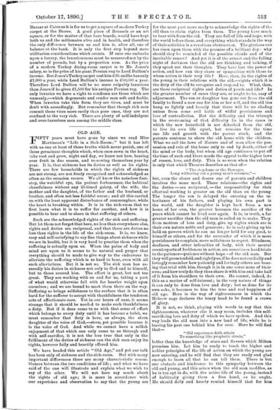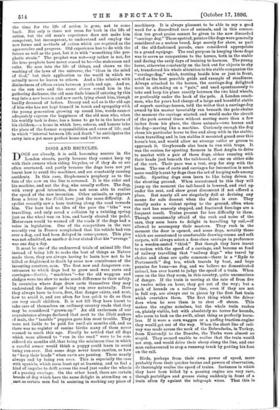OLD AGE.
FIFTY years must have gone by since we read Miss Martineau's "Life in a Sick-Room;" but it has left -with us one at least of those truths which never perish, one of those germinant thoughts which, when once sown in the heart, take root and grow, night and day, we know not how, bearing ever fruit in due season, and re-sowing themselves year by year. It is, that sickness has its duties as well as its rights. -There are few households in which the rights of sickness are not strong, are not freely recognised and acknowledged as often as the occasion recurs. We all know the noiseless foot- step, the watchful eye, the patient forbearance, the habitual -cheerfulness without any ill-timed gaiety, of the wife, the mother and the daughter, of the father and the husband, or -brother, and often not less faithful nurse ; and all this carried -on with the least apparent disturbance of commonplace, while the heart is breaking within. It is in the sick-room that we -first learn what it is to suffer for another, and how it is possible to bear and to share in that suffering of others.
Such are the acknowledged rights of the sick and suffering. But let them not forget that here, no less than everywhere else, rights and duties are reciprocal, and that there are duties no less than rights in the life of the sick-room. It is, we know, easy and self-satisfying to say fine things about sickness while we are in health, but it is very hard to practise them when the suffering is actually upon us. When the pains of body and mind are upon us it seems to be natural and proper that everything should be made to give way to the endeavour to alleviate the suffering which is so hard to bear, even with all -such alleviations. But it is not so. The sick man has as. suredly his duties in sickness not only to God and to himself, but to those around him. The effort is great, but not too great. They are working with us and for us, taking a part of what would otherwise fall with far heavier weight upon ourselves ; and we are bound to meet them there on the way. 'Suffering so brings selfishness to the surface that it is often hard for the sufferer to accept with thankfulness the tenderest acts of affectionate care. Yet in our hours of ease, it seems strange that it should be needed to make such thankfulness a duty. But if it does come to us with that sense of effort which belongs to every duty until it has become a habit, we -must remember that duty is here, as always, the stern -daughter of the voice of God,—stern, yet possible because it is the voice of God. And while we cannot have a selfish enjoyment of that which can only come to us through and with self-sacrifice, it is not the less true that only in the fulfilment of the duties of sickness can the sick man enjoy its Tights, however fully and heartily offered him.
We have headed this article "Old Age," and yet our talk has been only of sickness and the sick-room. But with many -important differences there are many characteristic resem- blances between the two conditions of life ; and what we have said of the one will illustrate and explain what we wish to say of the other. We will not here Bay much about the rights of old age ; it is more in accordance with 'our experience and observation to say that the young are for the most part more ready to acknowledge the rights of the old than to claim rights from them. The young have much to bear with from the old. They are full of life and hope, with the world before them, and everything which stands in the way of their activities is a vexatious obstruction. The glorious sun has risen upon them with the promise of a brilliant day : why should they be reminded of the possible clouds and of the inevitable sunset ? And yet it is of the sunset and the falling night of darkness that the old are thinking and talking, if they speak out their thoughts. They have lost the power of action, and how can they share or sympathise with those to whom action is their very life ? Here, then, lie the rights of the young in their relations with the old,—rights which it is the duty of the old to recognise and respond to. What, then, are these reciprocal rights and duties of youth and life ? In the greater number of cases they are, or ought to be, easy of adjustment. The son or daughter has gone out from the old family to found a new one for him or her self, and the old ties hang so lightly and loosely that there will be no chafing unless from some evil habit of wilful peevishness and love of contradiction. But the difficulty and the triumph in the overcoming of that difficulty lie in the cases in which the new household is not detached from the old, to live its own life .apart, but remains for the time one life and growth with the parent stock, and the parents continue to share the old home with the children. What we call the laws of Nature and of man allow the pos- session and rule of the home only to end by death, either of the mind or the body, but when old age continues to put off the time of such end there needs the appeal to the higher laws of reason, love, and duty. This is so even when the relation is only that which Theseus describes as that of- " The stepdame or the Dowager, Long withering out a young man's revenue,"—
but, even the closer and dearer one of parents and children involves the same need. These relations—the rights and the duties — are reciprocal, — the responsibility for their effectual working is greater on the old than on the young The longer the son is delayed the entering on the in- heritance of his fathers, and playing his own part in the world, and the daughter is kept back from a new home of her own, the greater becomes the sacrifice of the years which cannot be lived over again. It is, in truth, a far greater sacrifice than the old man is called on to make. They, from motives of love and duty, give up rights which are in their own nature noble and generous ; he is only giving up his hold on powers which he can no longer hold for any good, to himself or others, and for the surrender of which it is mere peevishness to complain, mere selfishness to regret. Blindness, deafness, and other infirmities of body, with their mental counterparts of feebleness in action, are sometimes hard trials to the patience—patience without hope—of the old man. But they will press tenfold, and rightly so, if he does not cordially and lovingly remember how patiently and lovingly others are bear- ing that trial with him, though it is in one sense none of their own; and how truly do they thus share it with him and take half of it from his shoulders to their own. He cannot, indeed, do this as a matter of self-interest ; in the very nature of things it can only be done from love and duty ; but so done for its own sake, it becomes to him the true and real happiness of old age. Here is the way of righteousness in which the Hebrew sage declares the hoary head to be found a crown of glory.
It is not, we think, playing with words to say that this righteousness, whatever else it may mean, includes this self- sacrificing love and duty of which we have spoken. And this way leads the old man into a new land of life, while he is leaving his past one behind hint for ever. Here he will find
that—
"Old experience doth attain To something like prophetic strain,"
better than the knowledge of stars and flowers which Milton promises him. Let him be ready to teach the higher and nobler principles of the life of action on which the young are now entering, and he will find that they are ready and glad enough to learn all that he can tell them. There is but one obstacle and hindrance to this sympathy between the old and young, and this arises when the old man meddles, as he is too apt to do, with the active life of the young, instead of habitually giving them a free hand, as he ought. He should daily and hourly remind himself that for him
the time for the life of action is gone, not to come back. Not only is there not room for both in the life of action, but the old man's experience does not make him competent, but incompetent, to understand and employ the new forms and methods of action which are required as the ages revolve and progress. Old experience has to do with the future as well as the past, but it is with "something like pro- phetic strain." The prophet was not—say rather is not, for the true prophets have never ceased to be—the statesman and ruler. He sees into the life of things, and shows us the working of the laws of the universe, the "ideas in the mind of God," but their application to the world in which we actually move he leaves to others. And a like relation with distinctness of offices exists between youth and age. And so, as the sun sets and the scene closes round him in the gathering darkness, the old man finds himself entering by this way into a new heaven and new earth, lying about him, though hardly dreamed of before. Dreary and sad as is the old age of him who has not kept himself in touch and sympathy with the young generation growing up round him, words cannot adequately express the happiness of the old man who, when his worldly task is done, has a home to go to in the hearts of his children,— a home in which love, esteem, and honour take the place of the former responsibilities and cares of life, and in which "interval between life and death" be anticipates the entry into a yet more perfect home and better rest.







































 Previous page
Previous page